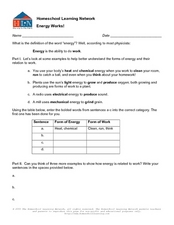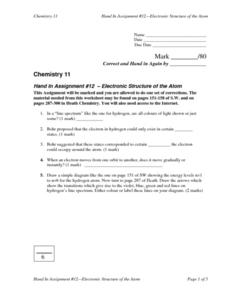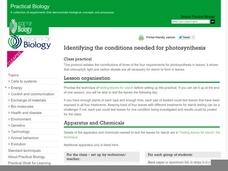It's About Time
What Determines and Limits an Atom's Mass?
Provide learners with the tools to further understand nuclear energy and isotopes. Young chemists investigate the components of an atom's nucleus, use symbols to represent various isotope forms, and use the percent abundance of an atom's...
Curated OER
20 Questions Energy Sources Scavenger Hunt for Energy Kids
In these scavenger hunt worksheets, students go to the 'Energy Facts' section of the Energy Information Administration Kids' Page web site. Students read through the different energy forms for renewable and nonrenewable energy. Students...
Curated OER
Energy Works!
In this energy worksheet, students review the different types of energy and determine what form of work that energy provides. Then students give examples of how energy is related to work. This worksheet has 1 graphic organizer and 3...
Curated OER
Integrating Chemistry-Chemical Reactions
In this chemical reactions worksheet, learners read about different types of chemical reactions, potential and chemical energy. They answer three questions about their reading.
Curated OER
Primary/Elementary Activity: Energy in Food
For this food energy worksheet, students rank the foods by the amount of energy they think the various food items have in them. Students then answer the 4 questions about food energy.
Forest Foundation
The Nature of Trees
Young botanists examine the different parts of tress and then draw parallels between the functions of these parts and the function of parts of the human body.
Agriculture in the Classroom
Six Kinds Do It All
Teach young engineers that all machines, no matter how complicated or complex, are made up of just six simple devices with this hands-on physical science lesson. Using the included templates, students first create paper models of...
Curated OER
The Many Faces of Energy
In this energy activity, learners are given a table of the many measurements of energy. They solve 6 problems converting from one measurement of energy to another using the conversion factors given.
Curated OER
Energy from the Sun
In this energy from the sun worksheet, learners are given 20 terms to complete sentences about the sun, the energy of the sun, the radiation of the sun, the transfer of energy from the sun and the currents created by the energy of the sun.
Curated OER
Mission 6: Renewable Energy
In these renewable energy worksheets, students learn about renewable energy and energy sources. Students complete a 23 page packet for the activity.
Oregon State
World Map of Plate Boundaries
Young geologists piece together the puzzle of plate tectonics in an earth science lesson. Given a physical map of the world, they search for land formations that indicate the location of different types of plate boundaries.
University of California
Hot! Hot! Hot!
Calories are not tiny creatures that sew your clothes tighter every night, but what are they? A science lesson, presented at multiple levels, has learners experiment with heat, heat transfer, and graph the function over time. It also...
Curated OER
Electron Structure of the Atom
In this atoms worksheet, students determine the energy difference between levels and draw diagrams of the different types of orbitals. Students determine the ground state electron configuration for given elements. This worksheet has 14...
Curated OER
Getting Energy to Make ATP
In this cellular energy worksheet, students review the stages of cellular respiration and contrast fermentation with cellular respiration. This worksheet has 6 fill in the blank and 6 short answer questions.
Nuffield Foundation
Identifying the Conditions Needed for Photosynthesis
Budding biologists often ask how scientists know what they do about different topics. In the lab described here, they have a chance to find out first-hand about the requirements for photosynthesis. Three sequential investigations are...
Curated OER
In the Eye of the Hurricane
In this science worksheet, students read about temperature and thermal energy in a hurricane. Students also draw their own hurricane and label 5 different parts.
National Institute of Open Schooling
Chemical Thermodynamics
All chemical reactions require energy. To explore thermodynamics, classes read and discuss its laws, exothermic and endothermic reactions, enthalpy in many forms, calculate enthalpy problems, and use Hess' Law to calculate enthalpy of a...
Curated OER
Studying Photosynthesis
In this photosynthesis worksheet, students conduct an experiment to show the making of starch in a plant's leaves during photosynthesis. Students complete 2 short answer questions.
Curated OER
What Information is on the Periodic Table?
In this elements learning exercise, students review the information that is found on a periodic table including atomic mass, chemical symbol, atomic, number, and electron configuration. This learning exercise has 7 fill in the blank...
Curated OER
Aerosol Science
In this aerosol worksheet, students are given data for volcanic eruptions and the average temperatures of the Earth. They determine the change in temperature from the year of the eruption to the present year and use the means to...
Curated OER
Typical Numeric Questions for Physics I - Photoelectric Effect
As the title implies, here is a collection of typical photoelectric effect problems that physics learners need to be able to solve. They determine the amount of energy of a photon, the photons produced per second, the frequency required...
Curated OER
Unit 3 Bonding
An organized table charting the different types of chemical bonds arrays this resource. The octet rule, ionization energy, and the naming of compounds are also reviewed. Young chemists answer review questions in multiple choice fashion....
Curated OER
Name That Leaf
Take a walk through nature with a science experiment about leaves. Third graders use a branching diagram to group attributes of certain kinds of leaves, such as oak, pine, and chestnut. For extra practice, they can collect leaves and...
Messenger Education
Sensing the Invisible: The Herschel Experiment
The electromagnetic spectrum includes everything from very powerful gamma rays (which are used to treat cancer) to much weaker radio waves (which include microwaves). Through a hands-on activity, scholars explore the temperature...

























